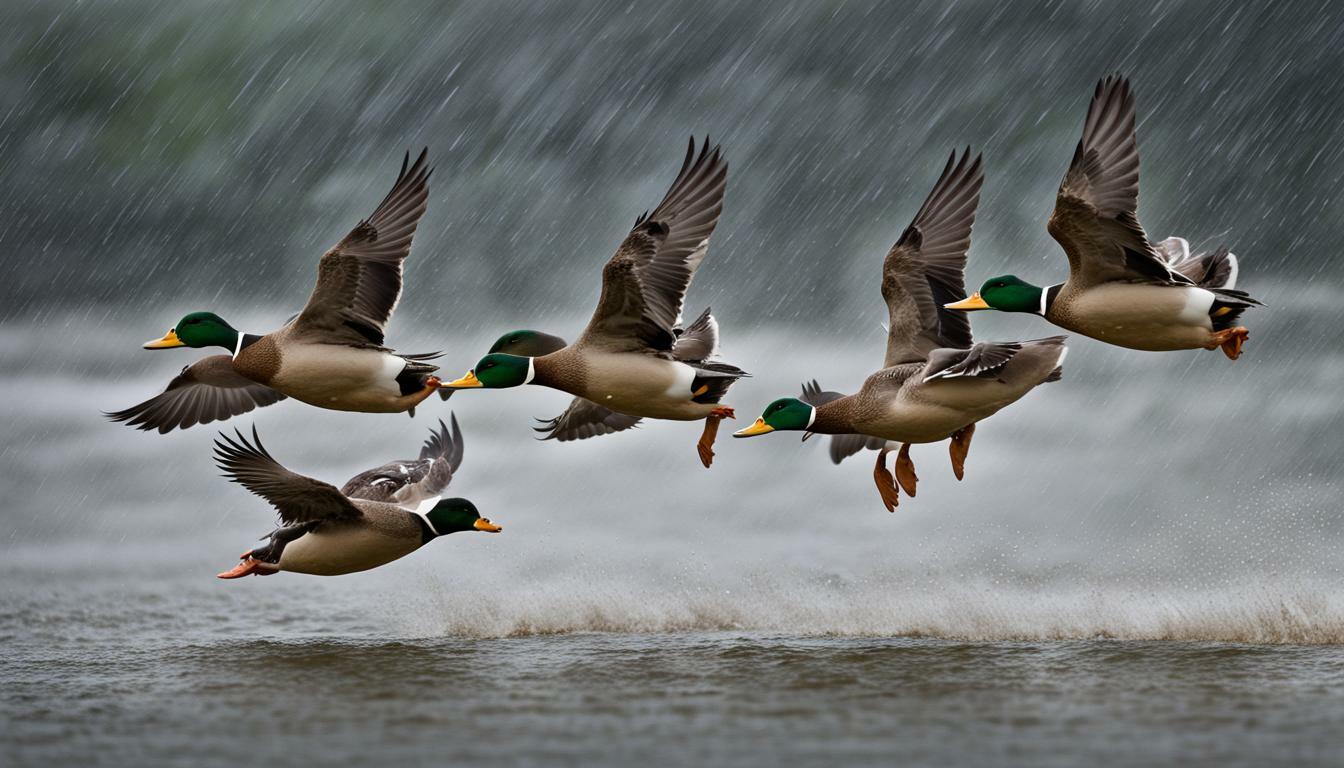Have you ever wondered if ducks are able to fly in the rain? It’s a common question among nature enthusiasts, and the answer might surprise you.
In this article, we’ll explore the behavior of ducks in wet weather and examine whether they’re capable of taking flight during rainy conditions. We’ll also discuss the relationship between ducks and rain during migration and provide some fascinating insights into these resilient creatures.
Key Takeaways:
- Ducks are able to fly in the rain thanks to their unique physiological adaptations.
- Rain does not significantly impact their ability to take flight, and they’re capable of migrating even in wet weather conditions.
- Although rain may alter their behavior to some extent, ducks are resilient creatures that are well-suited to navigate rainy conditions.
Duck Behavior in Rainy Conditions
Have you ever wondered how ducks behave in rainy weather? Do they change their flight patterns or become less active? Let’s explore the behavior of ducks in wet weather and how it affects their ability to take flight.
Ducks are well adapted to wet weather, thanks to a number of physiological and behavioral adaptations. Their feathers are naturally waterproof, which helps keep them warm and dry in rainy conditions. Additionally, ducks will often huddle together during rainstorms to conserve heat and reduce the amount of exposed surface area.
When it comes to flight, ducks are still able to take off and fly in rainy conditions. However, their flight patterns may be altered slightly. Rain can make it more difficult for ducks to see, which can affect their navigation and cause them to fly closer to the ground. Additionally, rain can also make it more difficult for ducks to hear, which can impact their communication with other ducks during flight.
Despite these challenges, ducks are still able to fly in wet weather conditions. In fact, they may even take advantage of the rain to find new sources of food and water. Wet weather can cause new sources of insects and vegetation to emerge, providing ducks with fresh food sources.
Overall, the behavior of ducks in rainy conditions is sophisticated and well-adapted to wet weather. While their flight patterns may be altered slightly, ducks are still capable of taking flight and navigating through the rain thanks to their unique adaptations.
The Ability of Ducks to Fly in Rain
It may come as a surprise, but ducks are indeed capable of flying in rainy conditions. This is thanks to their unique physiological adaptations that allow them to take flight even when conditions are wet. Rain does not significantly impact their ability to fly, and they are able to migrate even in wet weather conditions.
Ducks have a number of adaptations that make them well-suited to flying in the rain. For instance, their feathers are designed to repel water, which helps to prevent their wings from becoming waterlogged. Additionally, ducks have a layer of fat beneath their skin that acts as insulation, helping them to maintain their body temperature even in wet conditions.
It’s worth noting that while rain does not prevent ducks from flying, it can alter their behavior to some extent. For example, ducks may seek shelter during particularly heavy rain, or they may fly at lower altitudes to avoid flying through thick cloud cover. However, these adaptations do not hinder their ability to fly in the rain.
In conclusion, ducks are resilient creatures that are well-equipped to navigate rainy conditions. They are able to fly even in wet weather, thanks to their unique physical adaptations. So if you see ducks flying in the rain, know that this is perfectly normal and part of their natural behavior.
The Relationship Between Ducks and Rain during Migration
As ducks migrate, they often encounter a variety of weather conditions, including rain. But do ducks migrate in rain? The answer is yes, ducks do migrate in rainy conditions. In fact, some species of ducks actually prefer to migrate during wet weather, as it can make for an easier journey.
When ducks migrate in rainy conditions, they are able to maintain their flight just as they would in dry weather. This is thanks to their waterproof feathers, which not only keep them dry but also maintain their aerodynamics. Additionally, ducks have a unique respiratory system that allows them to extract oxygen from the air more efficiently, further aiding their flight abilities.
It’s important to note that while rain may not significantly impact a duck’s ability to fly, it can alter their behavior during migration. For example, ducks may choose to fly closer to the ground in order to avoid flying through clouds and heavy rainfall. They may also adjust their migration route or timing in order to avoid particularly severe weather patterns.
Despite any potential changes in behavior, ducks are well-equipped to navigate through wet weather conditions during their migration. So the next time you see ducks flying in the rain, know that they are capable and well-adapted to handle even the toughest of weather conditions.
The Surprising Truth About Ducks Flying in the Rain
Have you ever wondered whether ducks are capable of flying in the rain? It’s a common question amongst bird enthusiasts and nature lovers. In this article, we explore the fascinating world of ducks and their relationship with rainy conditions. Let’s dive in and discover the surprising truth about ducks and rain.
Duck Behavior in Rainy Conditions
Ducks are well-known for their water-resistant feathers that keep them dry in wet weather. However, rain can still impact their behavior to some extent. During light rainfall, ducks usually continue with their normal activities, including flying and foraging for food. However, during heavy rainfall, ducks tend to reduce their activity and seek shelter. They may also huddle together to conserve heat and minimize exposure to the rain.
Despite the changes in their behavior, ducks are still capable of flying in rainy conditions. They have unique physiological adaptations that enable them to navigate challenging weather conditions.
The Ability of Ducks to Fly in Rain
Ducks are highly adaptable creatures that are well-suited to survive in a range of weather conditions, including rain. They can fly in wet weather, as their water-resistant feathers prevent them from becoming waterlogged. Additionally, ducks have a streamlined body shape that helps them cut through the air, even in challenging weather conditions.
Many species of ducks also have strong wings that enable them to take off from the water’s surface with ease. This ability is essential for ducks that live in wetland habitats, where water is a constant presence.
The Relationship Between Ducks and Rain during Migration
Ducks are migratory birds that travel long distances to breed and winter in different locations. During their migration, they encounter a range of weather conditions, including rain. However, rain does not significantly impact their migratory patterns. Ducks are capable of flying in wet weather and can navigate through storms using their keen sense of direction.
Conclusion
In conclusion, ducks are highly resilient creatures that are well-suited to navigate challenging weather conditions, including rain. Even though rain may impact their behavior, ducks are still capable of flying in wet weather thanks to their unique physiological adaptations. Whether you’re a bird enthusiast or a nature lover, the fascinating world of ducks is sure to inspire and amaze you.
FAQ
Q: Do ducks fly in the rain?
A: Yes, ducks are capable of flying in the rain. They have unique physiological adaptations that allow them to take flight even in wet weather conditions.
Q: How does rain affect duck behavior?
A: While rain may alter their behavior to some extent, ducks are resilient creatures that are well-suited to navigate rainy conditions. They may adjust their flight patterns or seek shelter during heavy downpours.
Q: Can ducks fly during migration in the rain?
A: Rain does not significantly impact ducks’ migratory patterns. They are able to continue their journey even in wet weather conditions.
Q: Why are ducks able to fly in the rain?
A: Ducks have special adaptations that make them waterproof. Their feathers are coated in oil, which repels water and keeps them buoyant. This allows them to maintain their ability to fly even in rainy conditions.
Q: Is it safe for ducks to fly in the rain?
A: Ducks are well-equipped to handle flying in the rain. While they may adjust their behavior to minimize exposure to heavy downpours, they have the necessary adaptations to navigate wet weather safely.











